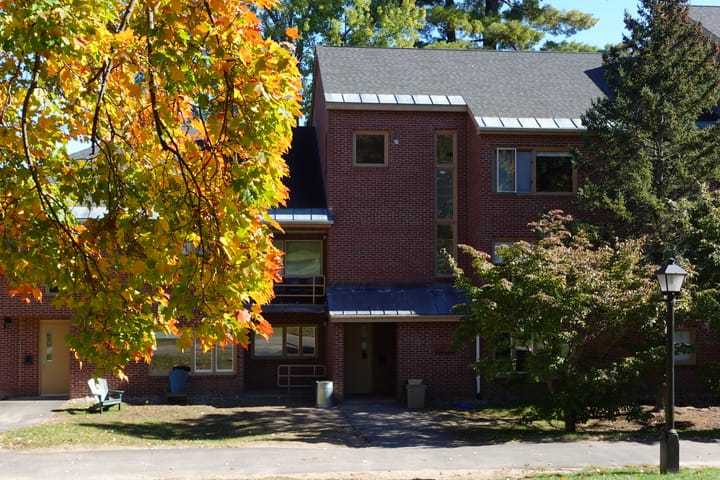Surviving College One Inconvenience at a Time
In the midst of midterm season, Assistant Opinion Editor Caroline Flinn ’28 reclaims complaints as small resistances against a college culture that often mistakes exhaustion for excellence.
Midterm season — which, let’s be honest, lasts until the end of December right before finals week — is here. The leaves are turning, the nights are colder, and I am spiraling into incoherent rage over both systemic injustice and deeply petty inconveniences.
It’s easy to laugh at the absurdities of campus life, and I am fully claiming my right to complain about every inconvenience, large and small, that dares cross my path. Let’s begin.
The third-floor Tyler House bathroom. I won’t elaborate. It’s just so weird. Then, the Tyler front doors. They each open in a different direction, like an architectural prank designed specifically to trip me up and remind me of my own fragility. Meanwhile, in Plimpton House, I have had the humbling honor of being trapped inside the first-floor bathroom for five seconds because the door would not open, not sure if that has happened to anyone else, though. Nothing makes you reevaluate your dignity quite like twisting a handle, whispering desperate bargains to God, and considering your legacy should this be how you perish. Walking up the hill is, as ever, a Sisyphean task. If you know, you know. If you don’t, try and carry my bag and also have asthma for a day. And I don’t even live on the hill.
The floors in Mayo-Smith Hall remain sticky, as they always do — a tradition, perhaps, but one that continues to unsettle me. The crosswalk near the Triangle makes you wait for about 10 minutes.
Let us turn to architecture. Frost Library is a nightmare, specifically designed to leech one’s will to live. Johnson Chapel 202 has one solitary window — lovely in itself, but wholly insufficient to mitigate the dungeon-like feel of the classroom. Then there’s A331 in the Science Center: four white walls so stark it feels like an asylum, which is redundant since I already feel like I’m institutionalized when I step inside that building. And also, why are all the Val outlets hidden in obscure places?
Val relocated the dessert section to a deeply annoying spot, Tandem Bagels have mysteriously disappeared from Sunday nights, and Winter Festival has been cruelly ripped from me.
Also: Why are people loud in the “quiet” section of Frost? Why are you taking a Zoom call on the third floor or having a full-on conversation in C level? Why is Mayo-Smith a tropical jungle while Val feels like the Arctic?
My posters are peeling off my wall, my sleep schedule is a wreck, and the semester began with a breakup. Add in Spotify’s decision to funnel every heartbreak song ever produced into my Daily Mix, and it’s no wonder I’ve been haunting the catacombs at midnight. My phone delights in reminding me of “one year ago today” photos I did not ask to relive. Autocorrect betrays me constantly. My laptop decided to die at 11:30 p.m. when I was writing a paper due at 11:59 p.m. My one pen that actually writes smoothly disappears into some void in my bag. And somehow, every pair of socks I own mysteriously develops a hole at the same time.
Meanwhile, I have grossly overcommitted myself: I have multiple jobs, both on- and off-campus, I’m co-president of multiple clubs, and I’m taking five classes (one is half-credit; and no, that doesn’t make it better). And I am definitely forgetting things.
These are small problems, the kind of things we turn into running jokes just to keep ourselves from losing our minds. But the reason these little inconveniences feel so heavy is because they pile on top of something much larger: a culture of unsustainable overwork, chronic exhaustion, and institutions that often rely on students to simply endure rather than thrive.
I mourn the hobbies I no longer have time for. When was the last time I went on a walk just to enjoy it? Or sketched something dumb for no reason? My knitting needles have been abandoned for weeks. My growing stack of unread books gathers dust (I just want to read the new Ocean Vuong book).
Beneath the surface, the exhaustion is real, and it’s not just the natural byproduct of being busy. From the moment you set foot on campus, you’re taught that the ideal student is someone who can do everything: Take a full course load, join half a dozen clubs, hold leadership positions, work a job, and still somehow have the social life of a Netflix original character. Burnout is not an exception; it’s built into the system. And when you live in a constant state of overcommitment, the small inconveniences become impossible to brush off.
The truth is, college is marketed as a place of opportunity and growth, but it often functions like a pressure cooker. You’re encouraged to do more, achieve more, and produce more, while the infrastructure around you cracks under the weight. Student support services — whether mental health services, academic advising, or even just functioning laundry machines — often feel like afterthoughts. The burden then shifts back onto us, as if the solution to broken systems is just for students to tough it out.
But here’s the problem: We are not infinitely resilient. We are not machines that can endlessly produce without maintenance, sleep, or joy. And yet the culture of higher education often depends on the illusion that we are. It thrives on students pushing themselves past their limits because that overextension fuels clubs, organizations, activism, and even the reputation of the college itself. Without that unpaid labor, the place wouldn’t run.
All of this exhaustion — the overcommitment, the relentless deadlines, the perpetual anxiety — is not an accident. It is the product of a system that equates human value with productivity. From the very beginning, we are taught that our worth is measured by what we produce: the clubs we lead, the internships we secure, the events we organize, the social media campaigns we run. Rest, reflection, and creativity are treated as optional, almost indulgent, rather than fundamental.
This ideology is reinforced at every level. The college touts “opportunities” and “excellence,” but excellence is defined by output, not well-being. When you fail to meet this system’s impossible standards — or when your energy finally runs out — the system falls silent. You are quietly blamed for not being resilient enough, not managing your time well enough, or not being ambitious enough. Exhaustion is individualized, even though it is structurally induced.
The question, then, becomes: How do we reclaim our time and energy in a system designed to consume both? It starts with acknowledgment. Acknowledgment that burnout is not a personal weakness, that leisure is not laziness, and that students — humans — deserve to live fully, not just survive. But does that mean we should “complain” more to achieve this? I think yes, but perhaps what we need more isn’t mere complaint, but deeper awareness — a willingness to name the weaknesses of the very system we’re a part of.
So when we complain — when we roll our eyes at sticky floors or cry in Frost catacombs at midnight — it’s not just pettiness. It’s a way of naming the imbalance, of saying that the current system isn’t sustainable, that we deserve something better than constant exhaustion wrapped in the language of “opportunity.” Complaining is, in its own small way, resistance against being treated as endlessly durable.





Comments ()